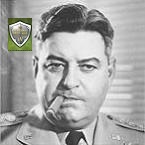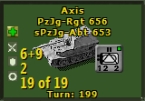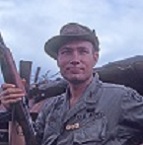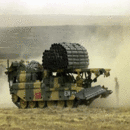ColinWright
Posts: 2604
Joined: 10/13/2005
Status: offline

|
quote:
ORIGINAL: Panama
There is one thing I'd like to point out concerning overwhelming odds. Demyansk.
I suppose there are other examples.
Velikiye Luki comes to mind. I should say the hell hole of...
There is a point where given troops of sufficient quality, enough of them, and continuing replacements and supplies, a position becomes simply untakable.
Verdun would be a good example. Eventually, the Germans just had to accept that they weren't going to make further progress. It didn't matter how much more artillery they brought up.
Of course, a Verdun might best be modeled by an endless succession of fresh units moving in and being able to promptly and completely fortify. However, the Germans neither could nor in TOAW should be able to just take the hex in one turn, once the French have enough defenders in the hex.
Ditto for Sevastopol in 1942. Had the Russians somehow been able to bring in additional units at will, it's problematical if the Germans ever could have taken the 'hex' -- and in fact, that's more or less what happened at Stalingrad that fall. The Germans were making progress -- but at a pace that would be hard to model in TOAW.
If any change is called for, it might be to both make 'fortified' -- as opposed to 'defending,' or 'entrenched' -- status harder to attain, and to make it still easier for units moving into the same hex to take over that status. Some French division moving into the line at Verdun didn't take more than a few hours to be substantially as fortified as its predecessor.
Then too, I often thought that the distinction between low-proficiency troops and high proficiency troops should diminish as the warfare becomes more static -- although this raises the issue of various kinds of low- and high- proficiency. However, summarizing the outcomes detailed in Glantz's books on the 1942 campaign suggests that while one German was worth five Russians in mobile warfare, the ratio fell to more like 1:2 if matters became positional. The German advantages of better and more flexible fire support, better and more flexible command and control, better and more flexibly trained soldiers, etc diminished as the fighting became more a matter of we are here in this cellar, and they are there in that ruined storehouse, and we know it, and they know it, and we know they know it, and they know we know...
< Message edited by ColinWright -- 8/21/2011 12:18:34 AM >
_____________________________
I am not Charlie Hebdo
|
 Printable Version
Printable Version



















 New Messages
New Messages No New Messages
No New Messages Hot Topic w/ New Messages
Hot Topic w/ New Messages Hot Topic w/o New Messages
Hot Topic w/o New Messages Locked w/ New Messages
Locked w/ New Messages Locked w/o New Messages
Locked w/o New Messages Post New Thread
Post New Thread